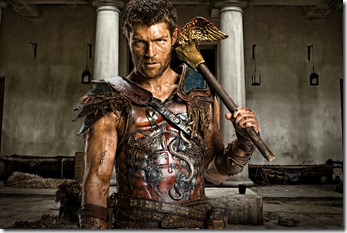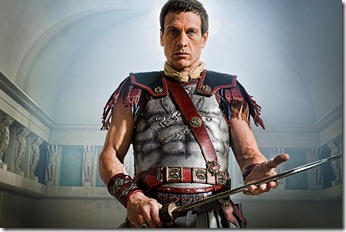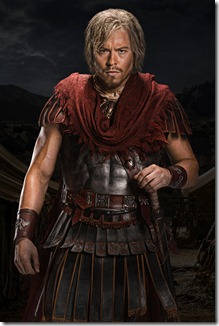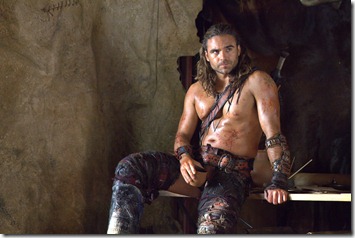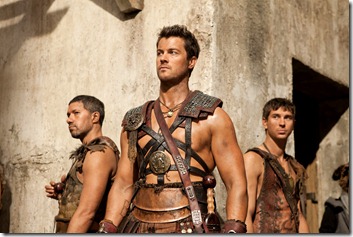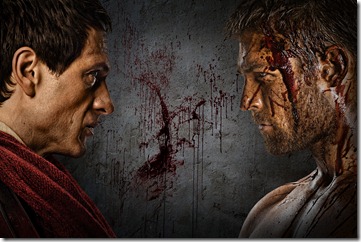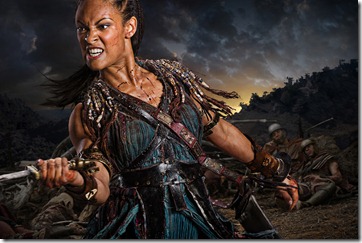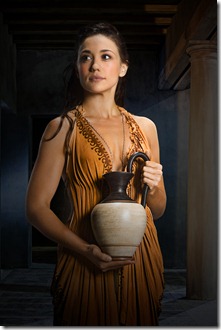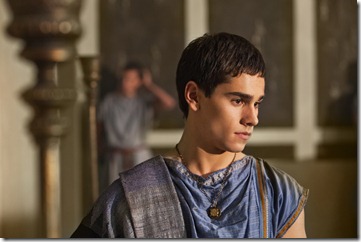This week marks the beginning of the end for Spartacus as Spartacus: War of the Damned (Starz, Fridays, 10/9C) premieres. As the final season’s subtitle suggests, we are now to the point where Rome has to take the upstart slave and his rebels seriously – what was once considered a distraction has turned to full on, bloody war.
On Friday past, series creator/showrunner Steven S. DeKnight and stars Liam McIntyre (Spartacus), Todd Lasance (Caesar) and Cynthia Addai-Robinson (Naevia) spoke with a group of journalists/bloggers about the show’s final season – for two-and-a-half hours! (Obviously, they care a great deal about the show and enjoyed doing it.
Hi everybody thanks for your time today. Steven I’m wondering if you could talk about Caesar’s entry into this show, I know he comes in the second episode. But how big of a threat is he going to be for our heroes?
Steven S. DeKnight: Oh he’s a huge threat. You know, early on we had a discussion in the writer’s room, you know, looking at the villain side. We had Crassus which is fantastic. But we felt like we needed another element to bring into it and we hatched this idea, ‘Well what about Caesar? What about a young Caesar?’ You know, really before he came to power.
We knew historically that Caesar of this time period was very much the order and he was a fighter. He was fighting in foreign wars, and he had this fantastic Julian name, but he was also broke. And those elements really matched well with Crassus. And we were also very interested in seeing the early days of Crassus and Caesar, before they joined together with Pompey and overthrew the Republic. We thought that would be a really great story to tell. And you usually don’t see that side of the story in movies and television shows about Caesar. It’s usually after they’ve overthrown the Republic, or right around the time they overthrow the Republic.
So then we brought in our (unintelligible) and said, you know, ‘How much would we destroy history by having Caesar as part of this war against Spartacus?’ And we were all very surprised when they told us that we wouldn’t be destroying history at all. And in fact this was the one small part of history that very little was known about Caesar. Everything else, there’s a lot written about him, except this one little area.
And there are many historians…
((Crosstalk))
DeKnight: Yeah, exactly.
((Crosstalk))
DeKnight: …and there are historians that thought it was probable that Caesar was part of this campaign against Spartacus and more than likely served under Crassus. So that gave us, you know, just enough to hang our (sort of) hat on. That said, everything in the show with Caesar is fictional. Although we do frame it with actual events from his past and we make references, very sly references to what’s coming in the future for Caesar.
And then, of course, we had to find a Caesar. And man, this was a hard, hard role to cast. Because I had a very specific thing in my head for Caesar. He had to have a presence, he had to have – you know, look like he would be a threat to the other gladiators. And most importantly, he had to have this shrewd intelligence in his eyes. Really like a shark that was constantly, you know, thinking and looking for his next move.
((Crosstalk))
DeKnight: What was that? Oh yeah, if he was hot it was a bonus.
Todd Lasance: I’m just going to sit here quietly.
DeKnight: So then we saw so many auditions and just could not find the right combination. And then I saw Todd audition and I immediately called Rob up and said, ‘I got the guy. This is absolutely the guy. We need to lock him up as quickly as possible because we’re not going to find another actor that just embodies what we need from Caesar.’
And Todd did such a fantastic job. From the moment you first see him on screen, it is a different interpretation of Caesar that I think the audience has ever seen. And I think very right for this time period.
And I’ve read a lot of things online, Todd I don’t know if you’ve read any of these, but there’s been a small outcry of, ‘You guys suck, your casting is terrible, this guy looks nothing like Caesar. Caesar is old and bald.’
Lasance: A couple of my friends have said that.
DeKnight: Yeah, you know, people – just go back to what we’ve seen so much of. And, you know, Ciaran Hinds in Rome was so fantastic as Caesar. But that’s Caesar later in his life, that’s like 30 years later. In this time period Caesar, historically, is right around 29. And, you know, it just brings such a fantastic element to the show. I’m very excited for people to see this Caesar, the Caesar threat with the rebels. And also, just the way Crassus and Caesar interact is just a joy to behold.
That’s great. And Todd could you talk about just taking on the role and did you rely mostly on the script and your conversations with Steven? Or did you kind of delve into the history and the research in that respect?
Lasance: I kind of worked on two elements with that. First of all before I had a chance to speak to the producers I just had about six weeks to sort of do as much research. So I got as many books together as I could and did a lot of research online and sort of tried to get an understanding for that particular time period. Because, unfortunately, historically there is not a lot of information in his earlier years. Because, obviously, when he came to power and was emperor that’s obviously when a lot of it was documented.
So early on I did a lot – as much research as I could. And then once I landed in New Zealand, sort of sat down and spoke with the producers to get an understanding of what they wanted to see from Caesar. And obviously the character description as well gave me a little bit of an understanding. So it was kind of both of those elements.
And then obviously I just had to – with regards to the audition – going into it with no real notes or anything to take into the room. I just kind of had to put my own spin on him a little. So I guess you could say there was sort of three different elements that I brought together. Because obviously, if the audition worked, then there were elements that I used in that particular – in those particular scenes that they wanted to see again. So I wanted to keep that, keep that (through line) the character as well. So yeah, it was kind of three elements I guess you could say.
Well you all know how I feel about kick-ass chicks, so this question is for Cynthia. Naevia went through such a huge change last season and I’m assuming she’s going to be doing a lot of butt kicking. So what was that like in terms of learning to fight and all of that?
Cynthia Addai-Robinson: Well, I went through a really interesting sort of process both on a personal level and through working on this character. And essentially at the end of vengeance you saw the sort of beginnings of what Naevia is going to be this season in War of the Damned. And I think back to when I was hired and at the time I was hired I met with Steven. And I remember him giving me just a vague idea that I would be eventually fighting and kicking ass. But I don’t think I could have really imagined what I ultimately ended up doing. Which was some of the hardest work I’ve ever done really.
I don’t have a background in stunt work, fighting, anything like that. So for me it was very much, “Okay, I’m just going to jump into this. Take a leap of faith and assume that the producers and the writers won’t give me anything that I can’t handle.” But, you know, I definitely was pushed to the limits in a good way. And I, you know, very much cared about making sure that I could use all that training and the fighting to tell that story and to move that character forward.
So that was sort of what kept me motivated and kept me going. Because there were many times and many days where I just thought, ‘Oh my gosh, I don’t know if I can do this. I’m really out of my depth here.’ But I’m really happy with it and we have such an incredible support network with our stunt department. Who works tirelessly to get these fight sequences together, and I have to say some of the sequences this season are just absolutely amazing. And, you know, we work on the show. We put all this work into it. But, you know, I think I can speak for the group of us when I say that we’re also fans.
So when we watch it we’re just as into it as the audience. And, you know, so we’re all really excited to see what the end result is going to look like.
Man: And you look like such a bad ass this season. Can I say that?
((Crosstalk))
Addai-Robinson: You can say that.
Man: You are so good at being a bad ass, you should see her this season. You’re just like, ‘Damn, look at her.’
DeKnight: I think the audience is going to be absolutely blown away by Naevia this season. I mean she is – from the moment she walks on screen – every time we were watching dailies in the writer’s room, every time Cynthia would come on screen, we’d spend the next ten minutes talking about how cool you were.
((Crosstalk))
Addai-Robinson: Thanks guys.
DeKnight: I can tell you that the hair, the make-up, the costuming – just phenomenal.
Man: Knocked it out of the park this year, so good.
DeKnight: What a transformation.
Addai-Robinson: And it was nice to, again, this season I felt like I really got to own it. I know for the audience, when I showed up as Naevia 2.0 it was probably a bit (trying) in many respects. And, you know, now I feel like this season, you know, the audience hopefully they’ve moved past that. Either they accept it or they don’t, but at this point I know for me I can just really sort of own Naevia this season and I’m really excited for the audience to sort of see where the writers and producers have taken this character this year.
Good morning, I have a question for Steven. What was done on the production, I know it’s massive and all that, but to be more carbon footprint reductive, and save, and reduce waste.
DeKnight: That’s an interesting question. Perhaps me and Liam can speak more to that.
((Crosstalk))
DeKnight: I’m putting the pressure on Liam.
Liam McIntyre: Oh no, that’s fine. I think they do an incredible job. They recycle everything you could imagine, like the costumes. They’ve got a warehouse of costumes that they keep revising rather than, you know, trying to…
((Crosstalk))
McIntyre: …as much as they can. You know, which is perhaps easier than to just take stuff and completely make new things rather than having to adapt things. And I think everyone is very conscious of that, obviously in the offices they’re very conscious of waste paper. And we weren’t allowed to get scripts on a certain size paper because it wastes too many trees and stuff like that.
(Unintelligible), I can’t speak for the exact nuances of their plan as far as the producer’s point of view. (Unintelligible) ecology plan. But from an actor’s point of view, seeing a few things like that I was actually very impressed with the way that they just tried to maintain a balance…
Did you get (your) scripts by electronic transmission, did they send…
McIntyre: Well there’s certain risks associated with sending a script by electronic transmission. As long as you can code them and stuff like that. With something as lucrative as Spartacus, the subject can get a little dangerous.
They rather insist that you return scripts so they can break them down and recycle them. And also make sure that they’re also, you know, so you can’t just take a script and just chuck it in the bin or something like that.
They do what they can to keep it a functional office, but a very Earth conscious one. As much as reasonable. I was appreciative of their efforts anyway.
Thank you.
McIntyre: Of course. There you go Steve. Nothing to it.
DeKnight: Perfect.
McIntyre: How’d I do? Alright?
DeKnight: You did great.
I’m curious about the decision to end the show and when that was made in terms of work on this upcoming season. Had it begun already?
DeKnight: No, thankfully we knew at the end of Spartacus: Vengeance when we were still writing the show. We were writing the last couple of episodes. And we knew there was a 99% chance that the next season would be our last season. So it gave us plenty of lead time to plan the end of Vengeance. So we could springboard into War of the Damned.
So thankfully we had, you know, it’s a very rare thing in television – we had plenty of time to figure out where we were going to go. The only question was how many episodes we were going to do. And we went through a lot of different variations. I mean everything from let’s do eight episodes so we can spend more money on each episode, to how about 16 episodes and we’ll air it in two parts. But ultimately we thought that 10 episodes would give you the most bang for your buck.
And I personally like the Princess Bride, let’s cut out all the boring parts and just give 10 fantastic episodes. And hopefully we have.
And the decision to end the show, was that yours? Was it the networks? Because it’s unusual to see a show as popular and does as well in the ratings as Spartacus, and before five seasons.
DeKnight: Yeah, you know, it was a combination. It really was. There was a lot of factors going into it. Factors, everything from story, just looking – my original plan was five to seven seasons. Then we got to the war years and the more and more I researched, the more and more all of the things that happened in the war were incredibly interesting. Also incredibly expensive and somewhat repetitive.
Spartacus and his band of rebels didn’t exactly have a dramatic three act structure to what they were doing. They were all over the place. They fought among themselves, they split apart, they came back together, they split apart, they went North, they went South, they went East, they went West, they went back North, they went back South. It was really a – when you read it, you really get the sense that there was no plan. It was just, you know, they were out and about.
And then it was one wave after another of Romans going after them and Romans getting defeated. So I really struggled with how to lay this out in an entertaining fashion for two or three more seasons. Without completely jettisoning history. And I didn’t want to completely turn my back on history and just make it fictional.
So it was a group decision, and a bold one I think for Starz. Everything they’ve done with this show has been a bold choice. But to end – and I kept saying, you know, look we would rather end this show on a high note at its most popular than drag it out for a couple more seasons. And have the audience start to fall away and people starting to get bored. And I totally agreed with that. I thought it was a great opportunity to end it and really end it strong.
You mentioned history and I wonder given the real history of Spartacus, should viewers be (sealing) themselves for a downer ending.
DeKnight: Well, you know, I have a long history of ripping hearts out. So, yeah, it’s a gut wrenching finale. But the interesting thing, and I’m so proud of the series finale. It’s so hard to end a series, but I think everyone did such a fantastic job on this. It is a beautiful, powerful, emotional ending. And the trick was, how do you end it – and this was something we talked about before we shot the first episode of the series, was what are we going to do at the end.
I mean, everybody knows how it ends. It would be like doing a movie about the Titanic and the Titanic doesn’t sink.
Man: I saw that, it wasn’t good.
((Crosstalk
DeKnight: …you know, Quentin Tarantino did it spectacularly…
((Crosstalk))
DeKnight: But for us we wanted to (keep) as close to history as possible. So the challenge was, how do we have that ending but still make it a victory. And, you know, the last episode is called Victory and it’s a bit of an ironic title. Because it really explores, you know, how the rebels gained victory in defeat. And how, frankly, with the Romans how they suffered defeat and victory.
No one comes out of this clean at the end. In true Spartacus fashion, it’s all very grey at the end. But there is a powerful, I think, uplifting message at the end. And, you know, I’ve said this before but I wrote the finale, I watched all of the dailies, I saw cuts, but still at the end of the day when I watched it I cried. It was so powerful. So I can only imagine what the audience is going to feel.
McIntyre: Yeah, it was very cool for us though. Especially for the rebels to sort of find a way, how do you win? How do you win out of all this that happened? Sort of a cool challenge. You know, I think they do a pretty good job. I really feel like Spartacus kind of wins.
Lasance: No, he doesn’t.
((Crosstalk))
McIntyre: Todd’s like, no, he doesn’t.
Lasance: I had to pop up, sorry I had to.
McIntyre: Alright you and your fancy…
Lasance: Fancy long hair.
Liam, I watched the first two episodes and there is definitely a few moments where I’m like, ‘Spartacus? What?’ So I guess I would like to ask how he has sort of changed as far as his attitude towards things in sort of the grey area.
McIntyre: He’s a lot more no nonsense this year. It’s been fun. I liked (that) the writing team have kind of clearly delineated Spartacus in each season. He’s a reluctant slave, you know, who has the mission to regain his life essentially. Or, and that’s clearly defined in the second season that he’s lost his old life and he’s got the start of this new one as they take on this unique new responsibility that is given to him. Which is, you have the real opportunity to make a difference to so many lives, is that the person you are? And he sort of works that out.
But now it’s about a year later almost in the midst of this war, this full scale rebellion that was made so famous. He’s not the questioning guy that he has been in the past about what he should be doing and how he should do it. He’s no nonsense, kick-ass, take names kind of guy now. And he’s been a lot of fun to play.
It’s a great season for Spartacus this year because he gets to look at the rebels in a different way, you know? Up until now he’s just been, you know, trying to get his own personal vengeance. And also try to free these people that look to him for leadership. But now he’s seeing that freedom, you know, a different shape to the beast of his rebellion. Are they as good as he wants them to be? Are they doing what he thinks is right? Are they doing the right thing, you know? There’s a lot of questions raised about who the good guy is in this series.
And one of the things I love about what Simon and Todd do in the roles of Caesar and Crassus is they really get the audience to sort of question of who are they going for? And that’s one of the things I love about this show, is that the bad guys aren’t really bad guys. They just happen to be fighting the hero. And so you’ve got to put them in that pile.
But yeah, so Spartacus has really hardened up and he has to – he sort of realizes that it’s going to be his strength of will that leads these people to freedom or otherwise. And if he’s going to have any chance against the impossible might of Rome he’s going to have to steer the ship. So he’s in a very firm place now.
Great, is there any possibility that we’ll be seeing Spartacus with Crassus and the others before the end? Because generally we have to wait till the big finale for it, but I just felt that your characters are so intriguing I’d like to see action ahead of time.
McIntyre: Yeah, we get a lot of moments. There will be some bigger than others, but yeah they will not be too separate. They, obviously, whenever they’re together it’s probably not going to go well. But no, Steven has some wonderful little ideas this year about how to keep the interaction quite creative and I think it’s ultimately very…
((Crosstalk))
DeKnight: That was definitely one of the trickiest elements of this season. Because now you’ve got two forces. You’ve got Crassus and Caesar and Spartacus and his rebels. And whenever they’re together, they’re not going to be standing around talking. They’re going to try to murder each other. So finding creative ways to get around that was definitely a challenge.
And I have a follow-up Steven. There’s been much said about Crassus and Julius Caesar, but I was also intrigued by some of the other new characters. Could you say something more about Kore and Tiberius? And what their roles are and questions that are brought up by their presence?
DeKnight: Yes, Kore is Crassus’ trusted and beloved house slave. And really I think his general compass is heart. She plays a very, very large role in who Crassus is. And I really wanted to find a way to humanize Crassus. He’s not a monster, he is not a two dimensional villain. He has feelings, and desires, and he has a heart.
Tiberius is Carrus’ son, his youngest son. He’s going to war for the first time with his father. And that’s the other dynamic I thought was really important for Crassus. Is to show this father son relationship and that balance between needing to guide your son in the right path, in the Roman way. But also this struggle about, you know, you want to be tough but you want to also show love. And that constant struggle for Crassus is something that plays out through the entire season.
Those two elements, the Kore and Tiberius elements, I think, were vital in really fleshing out the character of Crassus.
Well what I felt was intriguing also was that Tiberius seems to also have respect and sort of reverence for Kore, even though she is a house slave too. So he picked up something from his dad? Or what is that relationship like?
DeKnight: Definitely. That’s something in the first episode that I wanted to show about Crassus, is that he is not a guy that feels like all slaves should be ground under the heel. He, in this time period I believe, was the largest slave owner in Rome. And he didn’t just own slaves that did, you know, manual labor. He owned slaves that were scholars and architects. It was like a labor force. He made money off this because he would rent out his experts to other Romans to do work for them. And, you know, to teach their children.
And he made quite a bit of money out of that. And also a lot of people think that slavery in this time the slaves were all in chains, were all treated poorly. But, in fact, a lot of slaves had their own homes, had their own families. But they were, you know, under the slave owner. And Crassus really had the most elite level slaves. And there’s a certain, I think, respect that he has for them.
He realizes, you know, this is a necessary component of this society. And he completely accepts that, he’s not against slavery. But I wanted to show that he had a respect, and on some level a love, for certain slaves. And I think that all really, really comes out in his relationship with Kore and even his interactions with a slave that he has helping him train to fight in episode one.
McIntyre: (Unintelligible) defines Caesar’s relationship in that (unintelligible). In that sort of family environment as well. He’s sort of the outsider coming in to some extent right?
DeKnight: Yeah, family is just so important. You know, it’s a thing – Liam’s interviewing me.
((Crosstalk))
DeKnight: No, but family is so important. It was important in the beginning of this show with Lucretia and Batiatus and (unintelligible). And it was important with Glabor and Ilithyia, and Ilithyia’s father. And it is very, very important this season with Crassus and Tiberius and, you know, I include Kore and Caesar to some extent, in Crassus’ family. I think that building off that feeling of family is so important, and very important on the rebel side too.
Following up on the question before hand. Is there a point where Spartacus is going to say, ‘This is too far? These people are innocent, we need to stop.’
DeKnight: Interesting question.
McIntyre: That would be an interesting question. Look, all I can say is that the thing I like about Spartacus is he isn’t necessarily a cut and dried hero character. He’s aware of the world around him and the fact that it’s not a pretty Disneyworld. It’s not something with a Spielberg ending. And he kind of, you know, he has to take stock of what does he want, what’s it for, and what is he prepared to sacrifice to get it?
And, yeah, there will be many times that the Romans and his own rebels make him look at what he’s created and question whether or not it’s okay what he is doing and the people around him are doing. Both sides. To tell you exactly how he decides that would be ruining the story, but it is part of what makes this character so fascinating.
Because he’s not always the good guy. And some of the things that make him the hero I like to think he is, are those difficult decisions that aren’t always good guy decisions. And so when he does fight and fight the good fight, it sort of more important. So he will be tested more than he ever has been and what is he doing, and why is he doing it?
Is there someone in his group that maybe acts as a bit of a conscience for him?
McIntyre: Yeah, I’ve always thought that. Strangely enough, you’d never think it on the surface but, (unintelligible) is something of his moral compass. Because he’s the only one that really tells Spartacus the truth. Whether it’s from the minute he met him in Vengeance, because you know obviously I think, Varro was that kind of guy back in Bloody Sands. He was the friend that just told Spartacus how it was.
So Spartacus didn’t have that for a while. And then this rock star Gannicus comes along and just sort of lays it out in a way that Spartacus didn’t get any more. And throughout Vengeance and War of the Damned, they have this very – I love it. A very interesting relationship where two of the toughest men there are sort of lean on each other in sort of intercept able ways, in sort of manly ways. And they open up to each other that makes sort kind of (right) for the other character.
So yeah, they have this strange, you know, odd bond. That like neither of them sort of looks for, but there it is, you know. And I really like the way their journey goes, especially this season.
DeKnight: Yeah, that relationship was so important to me this season. And it really bookends the season. There is an important scene in episode one between the two. And there is a call back to that scene in the finale that is really, really important. And that scene in the finale, the call back, when we were fighting the page count and the original breakdown of the script said it would take, I don’t know, 32 days to shoot. That was one of the scenes that people were talking about cutting. And I said, ‘No, you can’t cut that scene. That’s a really important scene.’
In fact I think that scene, that call back scene, was not in the original draft of the finale.
McIntyre: Interesting.
DeKnight: And (unintelligible) said, ‘Hey I think, you know, we need a Spartacus Gannicus scene.’ And he was dead on. I think the finale would suffer without that scene between those two. Very, very important relationship.
I have a question for Todd. What makes this Julius Caesar, besides his age, different than the others that we’ve seen on television or movies?
Lasance: Interesting question. I think the element of, I think the idea of him having a bit of a rogue element sort of springs to mind as being different from the other seasons portrayed. He doesn’t, he sort of appears to not conform and stick directly to what would be a – what’s the word? A traditional Roman way. He kind of fly’s his own flag to a degree, but obviously there is still that respect element with Crassus.
So that rogue element was interesting, I wasn’t sure what was going to be introduced as far as this Caesar as well. Coming into the show I wasn’t sure of his whole character (act). So the rogue element was certainly interesting. I think his ability on the battlefield as well is something that hasn’t really been touched on in previous Caesars. Particularly as well, obviously given the fact that most of the time Caesar is betrayed it’s in his later years. But I think it will be interesting for the audience to see the fact that he was extremely formidable with the sword.
And he needed to be a direct threat to Spartacus and the rebels themselves and have that sort of physical presence in the sense that he needed to be an opponent that was worthy of fighting and could potentially take down the rebels. So they introduce a few one on ones between the higher ranking rebels as well. To kind of show off, I guess you could say, his fighting ability.
And it becomes quite apparent very early on that obviously he’s a definite physical threat as well. Not just a sharp wit, but also an extremely threatening on the battlefield. So I think those two elements will be something that hasn’t really been seen before in a Caesar in the past.
DeKnight: And to add to that. That was an element that I really wanted to show. Is just how dangerous Caesar was militarily. Since historically he goes on to fight a brutal campaign in Gaul and at this point in our story, he’s coming back from helping (unintelligible) fight against the pirates. So he knew how to fight.
He was a military guy, and he became a military commander. And that’s the other thing about Crassus too that I wanted to show. A lot of people just think of Crassus as the statesman, the rich statesman. But he actually, his nickname was the Hero of Common Gate, I believe it was. There was a big battle during the times of Marius where he did this decisive maneuver in a battle that won the day.
But I also looked in history for that and I wanted Crassus and Caesar both to be very, very good fighters. And for the audience to have the idea that, okay if one of these guys went head to head with Spartacus, you know, maybe he won’t win. But by God he’ll give him a run for his money. That they are dangerous and on the right day, at the right time, they could kill any of the main rebel characters.
Lasance: Actually adding to that as well. It was interesting for me to read personally about his – about the fact that at such an early age he was commanding legions. I think we lose scope of the age, do you know what I mean. I look at – I’m 27, and to think two or three years prior Caesar was commanding legions of men. And at the front line of the battlefield. I can’t even fathom what that must have been like.
So for him to prove himself at such a young age as well, I think it was important for that element to be introduced in the season as well. Or in the series itself. Just because people weren’t aware of that. I most certainly wasn’t aware of it until I came across it in the readings and, you know, we had – there’s a couple of accounts of high ranking soldiers moving to the front of the line with Caesar and wanting to be the first to charge the line, so they could die in his name.
So he obviously held an extremely large amount of respect with the military. And ultimately that’s how he gained so much power and became emperor, was through the military. So it’s an important element.
DeKnight: That sounds like a great show that I’d like to see.
((Crosstalk))
Lasance: Little drop in.
McIntyre: No, I keep saying that. I swear, I don’t want to talk it up too much. But whenever I watch it I’m just compelled by the Roman side of the story. I mean, truly I think Todd’s portrayal of Caesar is just brilliant. And honestly Crassus is a fantastic nemesis. He’s just unlike any other villain that we’ve portrayed so far. And those two together, they’re so different, but that’s what makes them (unintelligible) wonderful partnership. Because they are like two sides of the same coin in some regard. And the portrayals I think are just exceptional. They really blew me away.
Steven I wanted to ask you about Agron and Nasir this season. And what can we expect from that relationship? And what have you heard from people on, just the gay element of the show? Which I love how you portray it very much a part of the world we see, but what have you heard from audience members? And what could we expect?
DeKnight: I’ll answer this in reverse. You know, the support for Negron and Nasir has just been overwhelmingly positive. Better than I could imagine.
McIntyre: Agron.
DeKnight: Agron, who did I say?
McIntyre: Negron.
DeKnight: Negron.
((Crosstalk))
DeKnight: I’m so used to reading the shipper name online. I always say Negron. It was so overwhelmingly positive. And with Agron and Nasir, we’ve had gay characters on the show before. But this was the first time we could develop the relationship from the very beginning. Very slowly. And actually see them fall in love. Which was something both Rob Tapert and I both really, really wanted to do. And I think that last season with Vengeance, Dan and Pana both did such a fantastic job that, that awkward realizing you like somebody and those (urgent) glances, and it was just so beautifully done.
So the reaction to that has been, you know, just fantastically positive. The reaction overall to our same sex relationships, it’s been both positive and negative. Just like any cross section of society. There’s a lot of people who do not have a problem with it, that think the characters are wonderful and the storyline is beautiful. And there are segments out there that just freak out whenever you even mention such a thing.
Honestly there’s the same segment like with the male nudity. There’s a lot of guys that their head just sets on fire if there is a naked guy on screen. I personally don’t understand how either one of those is threatening if you’re a secure heterosexual male. But, you know, with some people we haven’t reached that point yet where everything is acceptable. And, you know, it just doesn’t bother you.
With Agron and Nasir this season, we continue exploring their relationship. You can’t always have a relationship that goes smoothly, there’s not a lot of drama in that. So we throw a couple of curve balls at them. But theirs is one of the relationships that I think is really kind of a cornerstone of this season. There are a lot of relationships going on, and there’s I think is particularly powerful, and gut wrenching, and beautiful.
Lasance: Yeah I feel like it really charts the course of the rebellion. Because as things get hotter and hotter and more high stakes for the rebellion, it’s really there relationship that gives you that insight into how all the couples in the rebel camp are dealing with the scale of what they’re doing.
DeKnight: They are a really good barometer as to what’s going on inside the rebel camp.
I have a question for Todd. In light of what Steven talked about earlier in the call about not much being known about young Caesar in history. I was wondering how it feels to be making history.
Lasance: To be perfectly honest with you I still remember so vividly the moment I found out I got the role. I was sitting with my parents at lunch and I got the phone call from my agent saying I was going to be playing Caesar and I nearly burst into tears because I was so excited. There were hugs all around and five minutes later I jumped in my car and I swear to God I was two minutes from calling up and pulling out of the role because the fear hit me of what I was just about to undertake.
It was extremely daunting, I will admit. I think personally I place a lot of pressure on my performances as it is, I’m very critical of myself. And I think with taking on someone like Caesar or anyone of historical value there’s – people have these preconceived sort of notions, or ideas, or images in their mind of what they would expect of Caesar. And for me as an actor, my fear came from a place of not necessarily when I have dialogue or when there is particular moments in a scene. It was more so when I’m not doing anything that I needed to, I felt this weight of needing to carry Caesar.
That you would look at, I had this idea in my head, that when you look at Caesar you need to see someone that would potential become one of the greatest rulers in history. So I think that played on my mind a lot and I wanted to do him justice, do you know what I mean? Whatever that justice would be. Especially with not having a lot of information to sort of work on I guess.
I had to go on a lot of instinct and a lot of work I did at home that I brought to the character. But my first day I was absolutely terrified, and it was obviously all shot in chronological order as far as episodes go. And the first thing that you do see on air was my actual first scene shooting.
So I think it was more just I wanted to do him justice and I was very aware of the fact that people had, quite famous actors had played the part and done incredible portrayals. And I wanted to live up to what people would expect to Caesar. I think it was probably also the expectations as well when they see Caesar, they’re going to expect to see some sort of X-factor. So I’m just hoping that, you know, that comes across.
Well I think you have the X-factor there.
DeKnight: And we’re all very glad you didn’t make that phone call.
Lasance: I swear to God I sat in the car and I was terrified. The first moment was pure excitement and couldn’t believe it. But then, yeah, it just – I think it hit me what I was just about to undertake.
McIntyre: That’s cool though, you get to define young Caesar. That’s pretty amazing.
Lasance: But even you saying that is why I was so scared.
((Crosstalk))
McIntyre: It’s yours now it’s awesome.
So another question for Todd, the thing that I like about Spartacus (unintelligible) is that there is always this sort of (unintelligible) machinations and the political side of it, which is really intriguing and dangerous. But then there’s also the brute force fighting too. Considering that, who do you feel is Caesar’s most dangerous foe? Tiberius or Spartacus?
Lasance: Without a doubt Spartacus, 100%. I mean, I guess, that’s a really good question actually. Look, Spartacus is his ultimate nemesis because he has the tactical mind, the strategic mind, the political mind. But also the skill on the battlefield, and Caesar is aware of that.
So Tiberius obviously has a lot of strength and qualities that could be potentially dangerous to Caesar. Particularly the relationship between him and Crassus, but I think it’s made fairly clear early on that Caesar feels like he has power over Tiberius and isn’t necessarily a threat. But interestingly enough he’s kind of a threat unbeknownst to Caesar as well. So there’s a lot of little dark elements that go on through the season that the audience may not be aware of until they show themselves.
But as far as the ultimate, I guess you could say the ultimate nemesis would definitely be Spartacus. Caesar feels like he’s is a formidable opponent, but at the end of the day he’s aware that Spartacus has put together this legion of men.
I don’t think there’s an element of fear per se, but he’s certainly aware that once he does meet Spartacus it’s not going to be – it’s certainly going to be a show down.
Okay, alright. Now I assume that following history, you deserve congratulations for probably being one of the few people to survive the season. And I was wondering if there were to be a Caesar spin-off, would you be up for it?
Lasance: Look, it would definitely be something we’d look at taking on for sure, without a doubt. There hasn’t been anything specifically officially spoken to me about, but it would definitely be something I would look at if it was brought to the table.
McIntyre: (Unintelligible).
Lasance: Hey?
McIntyre: Sign me up for a box set.
This question is for Steve actually. You know, you’ve had such great freedom with Starz to be able to craft this show and you’re working on another show. So what are some of the things that you’ve taken from your experience with Spartacus that you either want to move towards because it works very well for you, or are you looking to do some things very different in the same space?
DeKnight: Well first off Starz has been, I can’t tell you the freedom that they have given us. I don’t think anywhere else on television in the United States would we have been allowed to just follow our path. Every now and then there was a question about, ‘this seems a little bit too naked.’ Or, ‘that might be slightly too violent.’
I remember one of the biggest ones was my original idea of stabbing Lucretia, pregnant Lucretia, in the stomach in the end of season one. And at the time they said, ‘You can’t do that, are you nuts?” Everybody will hate Crixus if he does that.’ And I said, ‘Lucretia is evil, they won’t hate him.’
And then I waited, I bided my time for around four or five months. And then when we got to the end of that first season the idea popped up of Lucretia actually surviving the slaughter and I saw my chance and I sprung and said, ‘What if the only way she could possibly survive is if Crixus stabs her in the stomach?’
Because otherwise he’s going to chop her head off. So I squeaked that one by.
McIntyre: They probably didn’t win many of those battles by the sounds of things. If you’re talking about (unintelligible) right?
DeKnight: You know, I thought there was going to be a bit of perhaps an argument of Lucretia taking the baby over the cliff at the end of last season. And I was shocked nobody said a peep about it, everyone was fine. At that point everybody thought that was a great operatic ending. So they have been just fantastic and very supportive creatively.
For the next project I’m working on developing a show for Starz called Incursion that’s literally light years away from Spartacus. It’s set in the future, it’s a science fiction military show about this war on another planet. So it’s very, very different.
That said, I’d like to take some of the same elements that I love about Spartacus. Not specific elements, but the general feel. With Spartacus, Rob Talpert and I always approached it that our job number one among all else was to entertain the audience. And we wanted to, you know, make sure it was emotional, and twisty, and turvy, and surprising.
But we never wanted to lose sight of the fact that we wanted the audience to enjoy the show. And I think too often on this television landscape, especially once you get to premium cable, sometimes you can lose sight of the fact that there is an audience. You’re not just making the show for yourself. And, you know, it’s not a sin to actually have people enjoy what they’re watching.
There is, however, a chance you win less awards that way. But I think it’s a fine, fine trade off to have the audience actually enjoy what you’re doing.
Is there enough in terms of it being – you know there is a lot of war in Spartacus, seems that war is the center of it. Is there a different approach to how you want to explore war? You know, obviously the timeframe is going to dictate a lot of that. But dramatically, considering that’s where a lot of your writing comes from, what is the future, or space, or that new environment giving to you to look at?
DeKnight: You know Spartacus I always approached it as a grand operatic canvas. And that’s where everything is, the emotion, the language, the violence, they’re all bigger than life. They’re all stylized really. In the best kind of way, in the way that I love.
With the new show I’m looking to do the reverse. Where everything is much more real. You know, where the violence is very – it will be graphic, but it will be very real. And I really want to explore what happens to a person during war. How a person changes, and also explore – there’s a very strong religious undertone to the show. And explore religion and differences of religion. And how your ideas about God and faith can change during war time.
I’d like to follow-up a little bit about the vision that you had for this season. And now you mentioned the new show about how war changes people and maybe their religious beliefs. You’ve already hinted earlier that you wanted to make this one the bloodiest and give us some more good looking bodies like Todd.
((Crosstalk))
Did you want to show a little bit more? Because what I’ve seen so far of season 3, I see kindness and mercy but I also see insanity of the war. So do you basically already hint a little bit of what you make your next show? So what was your vision for this season?
DeKnight: Something that was very important to me and Rob Tapert going into this season was not to shy away from the brutality of our heroes. That historically, actually historically it was much worse. The rebels broke out and basically raped, pillaged, and murdered their way across the land.
So we always wanted to show that and to explore, you know, how that in a way the rebels are right in what they’re doing. They’re lashing out at the society that tortured them, and murdered them. On the other hand, they’re not lashing out at people that are guilty. The innocent get cut down just as much as the ones that perpetrated the crime. So it’s a very grey area morally with what the rebels do.
And there’s a lot of discussion with Starz, and this discussion went all the way back to the first season when the rebels were breaking out of (unintelligible), the question came up, ‘Well there are women in the (unintelligible). Shouldn’t they spare the women?’ and Rob Tapert and I went, ‘Hell no. Of course they shouldn’t spare the women.’ These are the same women that were standing up on the balcony, you know, yelling for two gladiators to kill each other. So just because they’re women, doesn’t mean that they’re forgiven for their crimes in our world.
And that really carries through this season, to an extreme. We explore some pretty dark, brutal things that happened on the rebels side. That really make you question whether or not you want to be rooting for the rebels. There’s a particular episode early on that is very, very brutal. Episode three.
It also gets you an insight into why some of the characters are the way they are and what happened to them in the past. So we really wanted to explore that for this season and the war. And not to make it cut and dry, clean, here are the heroes and they’re fighting the bad guys. I think that’s always, ultimately, unsatisfying. And something we’ve always really, really pushed to do on Spartacus is to make you question our heroes and at a certain point, make you love our villains.
McIntyre: And just around that framework that you talk about Crassus and his compassion for slavery. And his respect for Spartacus as a slave. While others in the Roman camp say he was just a slave, he’s pretty good for just a slave. He’s got the sort of sense of compassion for slavery, or understanding of their plight. Whereas you juxtapose that against the newly free rebels who are not as compassionate shall we say.
DeKnight: And I think you brought up something that is so important in this season. And something I wanted to make clear from the first episode of what makes Crassus different, unlike Glaber, unlike (Cassinius) and (Furious) who go after Spartacus that you’ll see early on in this season. They don’t, they always refer to Spartacus as that slave, that he’s nothing but a slave.
Crassus looks at him completely differently. Part of that I think Crassus is exposed to his own slaves who are very well educated. And he looks, he doesn’t look at Spartacus for what he’s been branded. He looks at Spartacus for what he’s done. And he sees that Spartacus is a brilliant tactician. And, you know, a man of keen intellect when it comes to battle. And he realizes that Spartacus will not be brought down with brute force. That to beat Spartacus, you have to play Spartacus’ game better than he does.
Which is very different than Glaber from last season. Crassus does not dismiss Spartacus. He realizes, you know, just how much of a threat he is. And how much of an opponent he is. And that kind of respect, I think, was really, really important.
And it works the other way around too. Spartacus has a very begrudging respect for Crassus.
McIntyre: I quickly realize that I’m up against something quite different that I haven’t really seen before. I’ve been playing off the Roman idea that I’m no threat to them, I’m really just really good at what I do. And then all of a sudden someone comes along who knows how to think like I do and can sometimes outthink me. And it puts a real big spanner in the works, it’s interesting.
DeKnight: It does. I’m going to start using that phrase.
McIntyre: Spanner in the works?
DeKnight: Spanner in the works.
And then for the (unintelligible), Steven mentioned victory in the finale. I assume you’re done shooting. So you’ve done, you’ve shot the Spartacus death. Can you talk a little bit, he publically just admitted of crying, so what was the last day of shooting for your guys with the death. And is Spartacus’ death the bloodiest that we’re going to see? Or is he going to be…
McIntyre: Nobody said the word death now. Easy darling.
DeKnight: Hey now.
Well we were talking Titanic here.
McIntyre: I know, you can justify this.
DeKnight: Historically most people think Spartacus was crucified because that’s what happened in the Kurt Douglas movie. (Certainly) his body was never found. So we have some leeway. I can’t say, you know, we stay pretty close to history. But there will be a few surprises in the end.
Well anyways, can the actors just in general talk about the last day of shooting? If it was a tearful day because they were saying goodbye to everybody else and stuff?
Lasance: Can I just move in on the fact…
((Crosstalk))
Lasance: …I was just going to say Liam, because he won’t talk about this, Liam gave the most incredibly humbled, beautiful speech I’ve ever witnessed. Out of any production I’ve ever worked on. We all came in for his last day and we got to see his final moment, which was a battle scene. And seriously it was incredible to be there. Everyone was just, yeah, in tears. There was a lot of emotion.
And Liam being the most humble person I think I’ve ever met. Gave the most beautiful speech, talking about thanking everyone else, and talking about everyone else, and what the production gave for him. Didn’t mention himself once. So for me, as an actor coming into the show just in the final season, it was a beautiful moment to see him not only finish, but also give an incredible speech. So that’s my perspective on it.
McIntyre: Thanks, that’s sweet. The thing is, I think the actors and the crew, everybody who was involved with this to a man, to a woman. We can probably all agree that it fundamentally changed our lives in some way this experience. Two years ago I don’t even know, I’m almost a completely different person to who I was two years ago. And it’s an almost completely due to Spartacus. Spartacus is just one of those things that happens to very lucky people. (Unintelligible).
Addai-Robinson: I was just going to add on top of this too. As far as the work experience and working in New Zealand, a lot of us were very far from home. And so we’re sort of working in this bubble and we became sort of a mini family. We all sort of lived close to one another, you know we’re seeing each other for very long shoot days.
So you get really used to it, and you realize as you’re wrapping up a show and a series, you’re also wrapping up your time in a really beautiful place with really beautiful people. So I think, you know, all of us were really trying to be excited about going back to all of our respective homes. But it was also very bitter sweet in saying goodbye to a lot of the wonderful crew and other people that are based in New Zealand.
McIntyre: Yeah, it’s quite funny. I remember when I got the job one of the things that (unintelligible) said to me was (unintelligible) like a family. And it will be like being part of a family. And he was unbelievably right. You’re right, it was just hard. Not only was that the most grueling and exhausting experience of my entire life, (unintelligible) demanding so much of every actor that was in it. But, yeah, at the same time you were saying goodbye to a family. It was hard, very hard.
I want to quickly end it on a fun note. We talked so much about Spartacus versus Caesar, what about Liam versus Todd? Who would actually win in real life? And for Steven, did you ever count how many buckets of blood have been used through all these seasons of Spartacus?
DeKnight: No, I lost count. Too many pools of blood that we use.
Lasance: I read like 300, what do you guys have gallons? Of blood.
DeKnight: Yeah, it was a lot. A lot of people don’t realize we use a lot of CG effects. But a lot of the CG blood effects, is actual real fake blood. That we explode, and push, and cut.
McIntyre: If I don’t see another blood balloon, I’ll be so happy.
DeKnight: We have these blood balloons and we shoot them against a green screen. Usually with the actors smacking the shit out of them.
McIntyre: It’s actually fun.
DeKnight: I think we should have in the Spartacus box set, just one blooper reel of all the blood bad stuff…
((Crosstalk))
DeKnight: …what I love about when the actors miss with these blood bags is just how hard on themselves they are. You can see how upset they are that they missed that.
McIntyre: That’s because we have Al Poppleton sitting there next to us going, ‘Mate, be less shit. Be less shit and do it right this time.’
You’re going to have to play Bond next time so you can wear a tuxedo right?
McIntyre: That would be amazing. Oh my God. I once had all of my legs, well not all of my legs, all of my limbs stuck together with blood. Because I was covered in so much blood that I couldn’t actually separate my body from the blood.
And Liam versus Todd? Who would win honestly?
McIntyre: Oh Todd is brutal, he’s built like one of those Michelangelo statues that you get in Rome. It’s…
((Crosstalk))
Lasance: No mate, I stopped working out a little bit. I finished that training regime.
McIntyre: That’s hilarious, you stopped training. I’m sorry but you’re just built like no other human being can be built.
((Crosstalk))
Lasance: We would just hug it out. That’s the thing, no fighting.
McIntyre: No, but it he’d hug the breath out of me.
First question is for Steven, and it’s just a very general one Steven. I wanted to find out what have you enjoyed most about your Spartacus experience? And what, also, are you maybe going to take away from it both on a personal and professional level? If you don’t mind me asking?
DeKnight: You know, one of the things I have enjoyed most about Spartacus is the joy of watching it. And just being amazed at how it all comes together. I mean, this is the kind of show that I just love. I think having the opportunity to play with language like this as a writer has just been phenomenal and, you know, unless we do a Caesar spinoff I doubt will ever happen again.
And the faith that Starz and Rob Tapert placed in me to do this slightly odd, effected, constructed language was just enormous. And there was a lot of worrying early on. There was a lot of discussion about if the audience is going to understand anything that’s being said. And, you know, I (unintelligible) to get used to the way people talk. But as a writer, there’s just no greater joy to have the freedom to play with language like that. And to see your words come to life on screen by such fantastic actors, was just an absolute joy.
What were the other two parts of the question?
Just maybe what you were going to take away from it on both a personal and professional level?
DeKnight: Well professional level, it’s just – I can’t even begin to explain what it’s done on a professional level. I think, for me, on a professional level, it’s done what it’s done for some of the actors.
It took me from writing on shows as at the time I was the co-executive producer, you know basically working for other people. And happily working for other people, actually working for Joss Wheden when I landed this job. But it took me from being a writer to being an executive producer/creator. Which is a very difficult set for a writer to make. It really requires a leap of faith from someone to give you that opportunity. It’s absolutely changed my career. It put me at a different level. It put me into the exclusive show runner category. Which aren’t a lot of in Hollywood. So on a professional level it’s just been stunning.
On a personal level it’s just – I’ve never created a show. And I’ve never guided a show from the very beginning to the very end. And just to go through that process and all the ups and downs, the triumphs and the tragedies from where we started when we first aired. We were universally hated, reviews were terrible. And to follow that to the end of the season where it all turned 180 and we were getting praised.
It was such a rollercoaster ride and, you know, the deep lasting emotions about Andy about having, you know, helped discover him and bring his talent to the world. And then to find out he was sick. And then to be told he was better and only to relapse and pass away, was, you know, so heartbreaking. It’s still difficult to talk about.
And then the rollercoaster ride of keeping the show going against all odds, bringing it back after the prequel. And see the ratings just keep rising. On a personal level it’s just – it’s hard to describe. It’s stunning. It’s a deep, deep gratitude for having had this opportunity.
And then final question, for Liam, and it’s a two-parter Liam. What is kind of stepping back into the role this season, what maybe or did you discover any new acting challenges with the role this season? And then part two of the question, how maybe have you seen yourself sort of grow as an actor playing this character?
McIntyre: Well it’s been a journey of a lifetime. Like Steven for saying. For me, to come out of such unbelievable tragedy and agony. And this year, I guess I had that year behind me to feel like, ‘Okay, I can be Spartacus. This can be my role a little bit this year.’ I was so overjoyed that the fans kept loving the show after Andy’s amazing job and me just trying to make sure I can honor that. And this year I was like, ‘Well what else can I bring to this guy?’ and it was great.
The writers gave me a whole new guy. He’s obviously the same Spartacus, but I mean, in my normal life growing up I was never like the alpha male. I remember getting into the boot camp for the very first time weird to see people like Manu Bennett, these just monstrously powerful men, you know. And these amazing characters. And I just sort of stand there, especially as I was just getting into things. When I was very underweight and trying to train my ass off. Going, ‘Hell I’m not going to be able to lead these people.’ Because there is an element of life that imitates art. So when you’ve got that many strong men together, even though they’re acting, they’re also kind of not acting at a certain level.
You know, so it was – that first year was an interesting process in seeing what made me a leader anyway. This was my first experience with being the lead of the show and things like that, so it was quite strange. And this year it requires Spartacus to be absolutely the dominant male as it were. He had to be absolutely sure of himself, absolutely able to in a heartbeat say, ‘this is what we’re doing, and there’ll be no discussion.’
And to embody that, for a person who historically like me – I was, I’m just not that kind of strong, tough, unwavering guy in real life. So that was a fascinating challenge. It’s why you get into acting. To just be people that you want to be. Spartacus is an amazing character and a phenomenal human being.
The idea that he really exists, still actually boggles my mind. That a guy could lead so many desperate cultures of down trodden people to any kind of unity like that is incredible. But it was, it was a fantastic opportunity to build on what I’d been learning every day of the previous year. And, you know, I’ve seen a rough cut of the final episode and, you know, to see the first episode I did of this show versus the last episode.
I’m so grateful for the opportunity I’ve been given. I’ve gotten to grow so much this year. I’ve learned so many things, I’ve got to work another astounding selection of actors and build relationships with the ones that I’ve worked with last year. I mean, they have amazing talent on this show and I love working with people like Dustin Clare, he’s just – you sort of work with him and he’s so effortless. You just, ‘Oh, okay. That scene seemed to go well.’ And then you see him on camera and you go, ‘Geez that guys amazing.’ You know, he’s truly fantastic.
So I’ve gotten to learn so much from my fellow actors. I’ve gotten to be directed by incredible people. I got to work with truly great scripts that you just don’t get. And, you know, people like Rob Tapert who are just so inspired in their vision and so clear in their message of getting that vision.
Early in the first one, in Vengeance, I was like, ‘Wow, you get to this stage in your career and it feels like you’re cheating.’ Like I’m used to working on short films and student films with no crew and nothing, and then suddenly you’ve got hundreds of people just trying to make your performance look wonderful. It’s opportunities like that that are just incredible in an actor’s growth. And that’s why I think so many of those in the cast have had their lives completely changed by what is truly a phenomenal and one of a kind show. We’ve all got to grow so much.
Steven we’ve talked a lot about the violence that’s in the season. But are there going to be any epic battles that you can talk about? And just for the actors, so they can think about it while you’re talking, I’d like them to tell me what their favorite episode is when you’re done.
((Crosstalk))
DeKnight: Sure, there are many epic battles. We start off at the tail end of one, that we see in the trailer, a great reveal of Spartacus coming up over a hill charging on a horse. And we really wanted to use that image, you know, this season is different. The scope is just spectacular.
There’s a running battle that happens mid-season that I think is pretty damn cool. And, of course, we build to an epic conclusion. I think the biggest battle that we’ve ever attempted, which is truly spectacular and I’m still scratching my head how we actually pulled that one off.
But yeah, the battles are fantastic. But more importantly, just like the early days of this show with the gladiator fights. The important thing for us was, what’s the emotion behind the battle? Who wants what? Who needs what? What are the stakes for the characters? Not just, you know, big fights. And that was a tricky part this season because the battles are so gigantic, but I think we managed to nail that one.
Great. Thanks, and now the actors, favorite episodes?
Addai-Robinson: I’ll go first I guess. Well I’ve only seen the first couple of them, so when we’re performing it versus what the final end result is. Is, you know, a night and day difference from what I’ve seen from the first couple episodes. Because you have to remember too, you know, often times we’re essentially working in from of a green curtain and we have an amazing post production team. They’re kind of the unsung heroes of the whole thing. Because they, especially this season, and I think advancements in technology – it’s cinematic, some of these backdrops and environments that we’re using this season.
So I think the audience is going to particularly be into that. I can say that I think my favorite episode that we worked on, which I haven’t seen yet, is sort of more towards the end. And that would be episode eight.
It was a monster, monster episode to shoot. And obviously can’t go into any details but I know, again, as a fan, as an audience member it’s one of the ones I actually can’t wait to see. And I’ve heard sort of little whispers about it, but I think that, you know, each episode we can’t afford to waste a frame, a word, a scene. Each episode is so dense, you know, there isn’t any one episode that’s kind of a lull in the season. Each episode ends and your jaw is on the floor and you’re like, “Oh my God. What’s next? What’s next?” so they’re all pretty powerful.
McIntyre: For me, I just can’t wait to see episode nine and how that comes together. Because, for me, that’s just before the epic finale. So (unintelligible), I don’t know… it’s sweet, it’s emotionally hard, and it integrates with history in parts I’ve been really looking forward to since the start of the story. And obviously again, I wouldn’t go through it and ruin it for people. But yeah, I was looking forward to some of that since I got the role. So there’s some stuff in line that I think you’d be really – well I’m excited to see.
Lasance: It’s always difficult picking a favorite episode because they have so many different elements. Liam just nailed it when talking about the shifts and also what Cynthia said about leaving your jaw dropped. I’m going to go with both of their answers.
((Crosstalk))
Lasance: It’s so boring but it’s so true. Anywhere sort of seven, eight, nine. I mean there’s a lot for me to do personally in seven. But yeah Cynthia is right, there’s some jaw dropping moments which just leaves it hanging. And then the next episode just floors you again, you think, “No, it can’t get any better than that.” and it just continues to escalate. So yeah, any of those episodes in there the audience is just going to be gagging for the next episode. Because it’s one of those moments.
We were talking about relationships earlier Steven, and you mentioned that in a sense Kore and Caesar are kind of part of a surrogate family with Crassus and Tiberius. And I was just wondering, how did you develop the Crassus/Caesar relationship beyond commanding officer and commanded officer.
DeKnight: Well to start with I took a page out of history. Crassus and Caesar, they have a very complicated relationship. They appear to be very close but they also, the letters that they sent back and forth that they really traded barbs. One of the most famous ones was Crassus came to Caesar’s aid and paid the ransom when Caesar was kidnapped by the pirates. But Crassus didn’t actually rush to pay it, and Caesar sent basically a, you know, rather irate note, you know, ‘Thanks for the payment, what the f*ck took so long?’
So they had a very, it was almost like a love/hate relationship. But Crassus definitely needed Caesar. He did not have the storied name that would propel him to the top of politics. And Caesar had the Julian name but had no money, he was broke. Crassus paid off a bunch of his debts and helped fund him in his political lies.
So we really wanted to explore the early days of that. That these are two guys that there is a mutual respect, and even I think, at the barest essence of their characters, a fondness for each other. But they are often at odds. Even though they’re working towards the same goal. They often don’t agree with each other. It’s a very rocky relationship. And really that was my building blocks for this relationship.
But you will see as we go along, that Caesar is very loyal to Crassus. And Crassus does have a great respect for Caesar. In my mind, I think Crassus feels like Caesar is kind of like a son to him. And, you know, it’s almost like the son you wish you had. Which causes problems with his real son.
And Caesar and Crassus’ son Tiberius, this is really like, I played it as much as I could like two brothers. You know, each vying for their father’s approval. And it causes a very interesting dynamic and spins into a hell of a great story.
Lasance: I like the way that you created this symmetry through a lot of so much of this season. Spartacus and Crassus, they’re not entirely separate from each other. And Spartacus and Crixus and Caesar and Crassus, they’re both very dominant in their two groups. And they’re both fighting for what they believe is right, they’re both similar but very different. There’s great symmetry in terms of all the stories this time around, I think it’s very nice.
DeKnight: Yeah, we were definitely shooting for that two sides of the same coin feel with the rebels and the Romans.
I was going to follow up by asking if Crassus saw Caesar as the son he hoped Tiberius would become, but I think you answered that kind of.
DeKnight: Yeah.
McIntyre: He’s using that psychic (unintelligible).
So thanks so much for all the many hours of wonderful television and continued success with your new project.
DeKnight: Thank you very much.
Photos courtesy of Starz Entertainment




